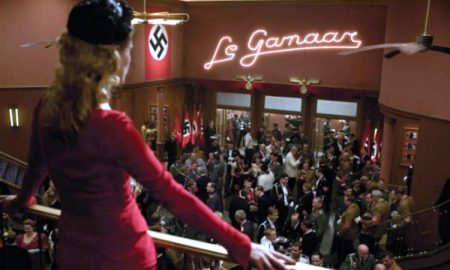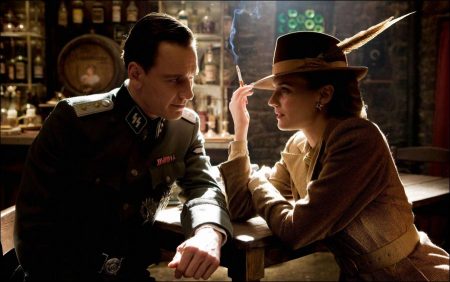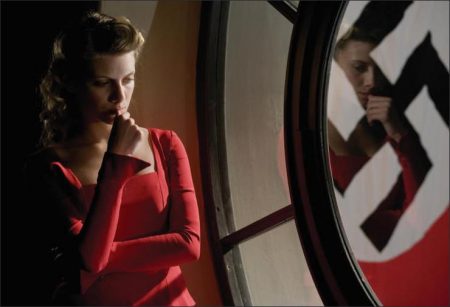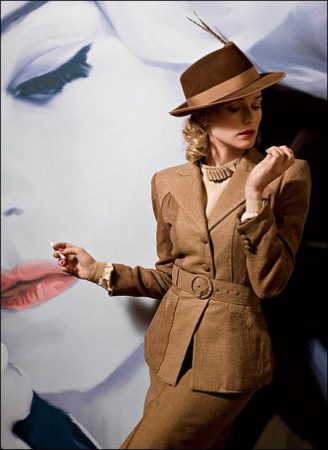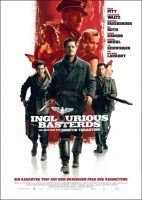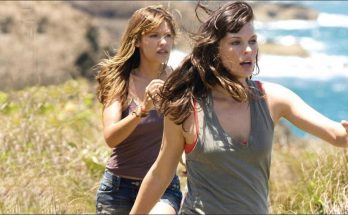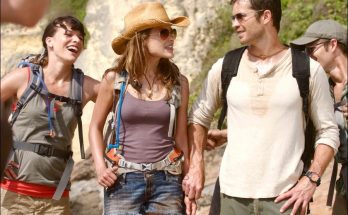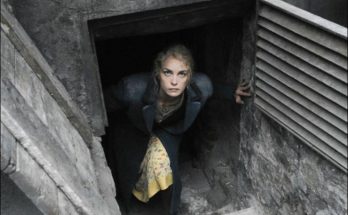Tagline: Once upon a time, in Nazi occupied France.
In Quentin Tarantino’s war epic Inglourious Basterds, a band of U.S. soldiers facing death by firing squad for their misdeeds are given a chance to redeem themselves by heading into the perilous no-man’s lands of Nazi-occupied France on a suicide mission for the Allies.
Inglourious Basterds begins in German-occupied France, where Shosanna Dreyfus (Mélanie Laurent) witnesses the execution of her family at the hand of Nazi Colonel Hans Landa (Christoph Waltz). Shosanna narrowly escapes and flees to Paris, where she forges a new identity as the owner and operator of a cinema.
Elsewhere in Europe, Lieutenant Aldo Raine (Brad Pitt) organizes a group of Jewish soldiers to engage in targeted acts of retribution. Known to their enemy as “The Basterds,” Raine’s squad joins German actress and undercover agent Bridget Von Hammersmark (Diane Kruger) on a mission to take down the leaders of The Third Reich. Fates converge under a cinema marquee, where Shosanna is poised to carry out a revenge plan of her own…
Inglourious Basterds is a 2009 war film written and directed by Quentin Tarantino starring Brad Pitt, Christoph Waltz, Michael Fassbender, Eli Roth, Diane Kruger, Til Schweiger, and Mélanie Laurent. The film tells the fictional alternate history story of two plots to assassinate Nazi Germany’s political leadership, one planned by Shosanna Dreyfus (Laurent), a young French Jewish cinema proprietor, and the other by a team of Jewish American soldiers led by First Lieutenant Aldo Raine (Pitt). Christoph Waltz co-stars as Hans Landa, an SS colonel tracking down Raine’s group and who has a connection to Shosanna’s past. The film’s title was inspired by Italian director Enzo G. Castellari’s macaroni combat film The Inglorious Bastards (1978).
Inglourious Basterds grossed over $321 million in theaters worldwide, making it Tarantino’s highest-grossing film until the release of Django Unchained (2012); it remains his second-highest grossing film. It received multiple awards and nominations, among them eight Academy Award nominations, including Best Picture, Best Director and Best Original Screenplay. For his role as Landa, Waltz won the Cannes Film Festival’s Best Actor Award, as well as the BAFTA, Screen Actors Guild, Golden Globe, and Academy Award for Best Supporting Actor.
Chapter One – Writing
INGLOURIOUS BASTERDS’s long gestation is best recounted via anecdotes shared by writer-director Quentin Tarantino’s friends and colleagues. Pieces of the story and elements from the script would pop up in casual conversations between Tarantino and his friends. The “men on a mission” espionage epic borrows its title from “Inglorious Bastards,” Enzo Castellari’s 1978 film.
Castelleri, who makes a small cameo in the film explains, “It’s a completely different movie, this is Quentin’s own thing, this is not a remake this is-this is something that I inspired.”
Nevertheless, the oft-discussed screenplay resurfaced here and there. Eli Roth, who plays “Basterd” Donny Donowitz, recalls: “My first encounter with INGLOURIOUS BASTERDS was in December of 2004, when Quentin read and acted out the entire Hitler monologue. It was my first time seeing what I now call `Quentin Tarantino Theater,’ where he reads his screenplay and plays every character.”
Roth continues, “I remember saying that I was so completely blown away by what he had read me. For years he would call me and say, `Hey I got a new scene for INGLOURIOUS BASTERDS,’ but then he put it down to do DEATH PROOF. About a year and a half ago he said, `I really think I want to finish INGLOURIOUS BASTERDS.
In the Spring of 2008, Tarantino also mentioned to Bender that he was focusing on INGLOURIOUS BASTERDS again. “I was excited for him because he seemed happy about it,” Bender remembers. “But I didn’t realize that he was actually close to finishing it.”
On July 2, 2008, Tarantino completed the final draft of INGLOURIOUS BASTERDS. Associate producer Pilar Savone, who has worked with Tarantino since her tenure as the 2nd Assistant Director on JACKIE BROWN, remembers the moment she got her hands on the script: “We call it `publishing day’-the day that he finishes, we get the script and send it out. He put it on my desk and we made copies. He called his friends and said, `I have my script. I’ve done it. Come up and get it.’ He had a long list of people he wanted to give it to. People came in and out of the house to visit and pick up their copies. When we were almost at the end of the list I looked at all the girls in the office and I was like, `We need some wine.’”
“I got a call from him July 3rd and Pilar sent me the script,” Bender recalls. “I scratched all my plans. I stayed home, I read the script once, and I was about to pick up the phone and I said, `I’ve got to read it again.’ I sat down and read it all again. Needless to say I was pretty thrilled with it.”
Tarantino explains: “Each chapter in the movie has a vaguely different look, and a different feel, and the tone is different in all of them. The opening feels like a spaghetti western, but with WWII iconography.”
Special effects makeup artist Greg Nicotero, who has worked with Tarantino since RESERVOIR DOGS, was another early reader of the script. There was a vast difference between what he thought the film would be and what was contained in the scripts one hundred and sixty-four pages. “I was thinking that there will be giant battle scenes, and carnage, and bodies being blown apart, so it was a great surprise. I had no idea where the script was going. I was just amazed at the level of detail, and that he made it as authentic as it could be.”
Those familiar with Tarantino know his commitment to making movies for global audiences, not just for Americans. Julie Dreyfus, who starred as Sophie Fatale in KILL BILL, comments: “When he did KILL BILL he also wanted to be as authentic as possible.”
Additionally, the screenplay surprised readers because real and fictitious characters interact seamlessly in an alternate reality. “The bottom line is that the first line in the script is `Once Upon A Time in Nazi-Occupied France.’ It’s a fairy tale, and it’s a fairy tale told with Quentin’s style,” Nicotero says. “It’s a fable, and it leads you down this really unique path from the opening scene.”
An eager and enthusiastic Bender met with Tarantino on Sunday, July 6, 2008, to discuss the project and the challenges that lay ahead. Bender recalls, “We talked about the script, and then we start talking about where we shoot it. We talked about all different places around the world, and focused in on Germany and specifically in Berlin.”
Tarantino told Bender that he wanted to have the film ready for the 2009 Cannes Film Festival, a nearly impossible feat. Bender remembers: “I said, `We would have to start pre-production tomorrow, and we would have to start shooting in fourteen weeks from tomorrow. We’ll probably be in Germany before we close a deal with the financing. We’ll be casting, we’ll be crewing, finding locations, doing all that work before we even have financing.’”
Executive Producer Lloyd Phillips says, “The first 2-4 weeks were insane and everything was happening so fast. I worked around the clock dealing with time zones, crew, accounting issues etc. Because we knew we were starting on a specific date, we needed to focus everyone’s attention. Without the great team we put together, we could not have hit that date. We really had a remarkable team.”
Tarantino and the producers sent the script to Brad Pitt and started out assembling the “Basterds.”
By the time Tarantino et al arrived in Germany, production designer David Wasco had already done extensive location scouts, and he had a room filled with photographs to show Tarantino.
The frenzied, spirited pre-production schedule had begun. Fourteen weeks after “publishing day,” the Basterds were ready to roll.
Continue Reading and View the Theatrical Trailer
Inglourious Basterds (2009=
Directed by: Quentin Tarantino
Starring: Brad Pitt, Diane Kruger, Melanie Laurent, Christoph Waltz, Daniel Bruhl, Eli Roth, Samm Levine, B.J. Novak, Til Schweiger, Gedeon Burkhard, Paul Rust
Screenplay by: Quentin Tarantino
Prodüksiyon Tasarımı David Wasco
Görüntü Yönetmeni Robert Richardson
Kurgu Sally Menke
Kostüm Tasarımı Anna B. Sheppard
Set Dekorasyonu Sandy Reynolds-Wasco
Özel Makyaj Efektleri Gregory Nicotero
MPAA Rating: R for strong graphic violence, language, brief sexuality.
Distributed by: Universal Pictures
Release Date: August 21, 2009
Views: 131
